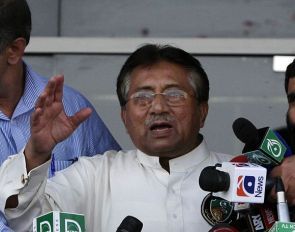 Beleaguered former military ruler Pervez Musharraf's efforts to wriggle out of a treason case suffered a setback today when a Pakistani court rejected his objections against the special court set up to try him.
Beleaguered former military ruler Pervez Musharraf's efforts to wriggle out of a treason case suffered a setback today when a Pakistani court rejected his objections against the special court set up to try him.
Justice Riaz Ahmad Khan of the Islamabad high court dismissed three pleas filed by Musharraf's lawyers against the constitution of the special court and the appointment of three judges and a state prosecutor to conduct his trial.
The special court has summoned the 70-year-old former army chief to appear before it on Tuesday to face a charge of high treason for imposing emergency in 2007.
This is the first time in Pakistan's history that a former military dictator is facing trial for treason. If convicted, Musharraf could face life imprisonment or the death penalty.
Musharraf had said in a petition that he promulgated emergency as the army chief and could only be tried by a military court.
He also objected to prosecutor Akram Sheikh, who has links with right wing parties and is known for his intense hatred of the former military ruler.
The judge rejected all these objections, clearing the way for Musharraf's first appearance in the special court.
Earlier in the day, the Sindh high court rejected Musharraf's petition for lifting a foreign travel ban on him. The court said the matter did not fall under its jurisdiction and refused to remove his name from the Interior Ministry's Exit Control List.
The court advised Musharraf's counsel to refer the matter to the government.
The government barred Musharraf from leaving Pakistan after he was arrested in four major cases, including one over the assassination of former premier Benazir Bhutto in 2007.
He has been granted bail in the four cases but his name continues to be in the Exit Control List.
Musharraf came to power in 1999 by toppling a government led by current Prime Minister Nawaz Sharif and ruled till 2008, when he resigned after being threatened with impeachment.
He lived in self-exile for about five years and returned to Pakistan in March but was hauled to court in different cases.











 © 2025
© 2025